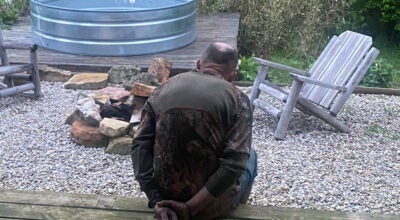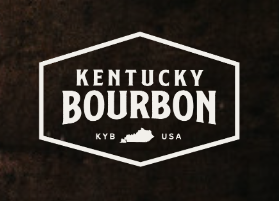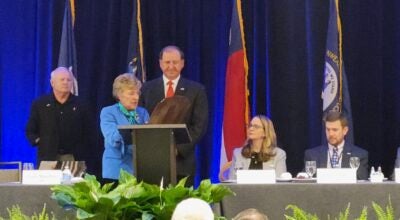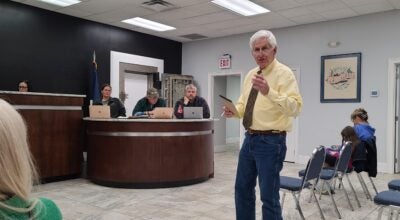‘Jail or death’ Teens learn truth in speaking with inmates
Published 9:04 am Saturday, August 26, 2017
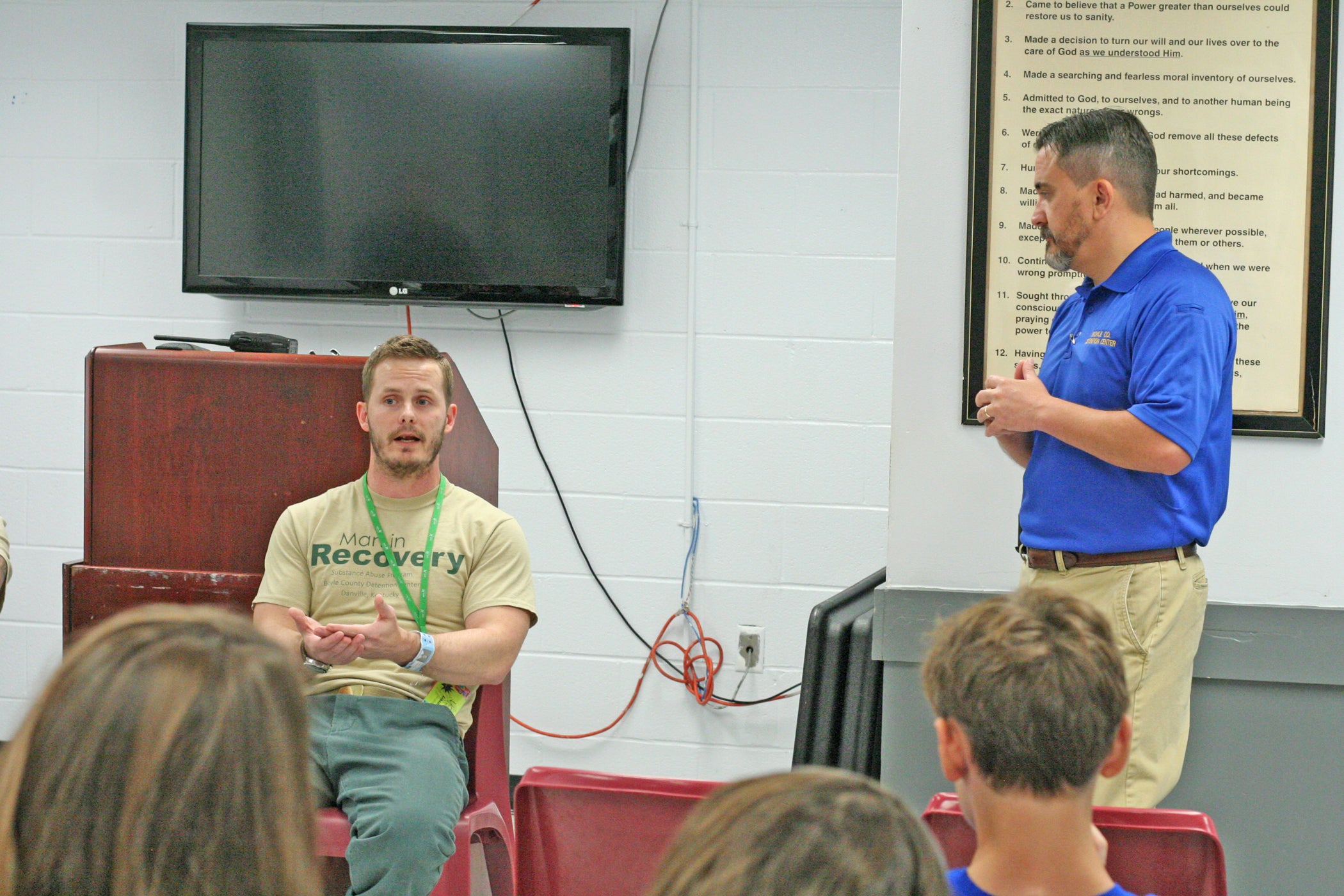
- Kendra Peek/kendra.peek@amnews Josh Daniel answers a question from Chief Deputy Brian Wofford while speaking to parents and teens on the Truth Tour.
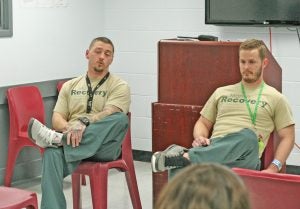
Kendra Peek/kendra.peek@amnews
Daniel Newkirk, left, and Josh Daniel, right, share their stories with parents and teens during the first Truth Tour at the Boyle County Detention Center. The two are inmates at the Detention Center, both in on drug-related charges, and participants in the Subtance Abuse Program there.
“People don’t realize when you experiment with drugs what dependency really is,” said Josh Daniel to a group of parents and teenagers at the Boyle County Detention Center Thursday night. “When you are so sick that you will do anything to get high — not even get high, just to get ‘well.’”
By get “well,” he said he meant to just feel better, not being what he referred to as “drug sick.”
“You’re so miserable, you can’t get high enough,” he said.
Daniel, from Lincoln County, is an inmate participating in the Substance Abuse Program at the Boyle County Detention Center and was speaking with the teens as part of the Truth Tour, a new program started at the detention center, in partnership with the Boyle County Sheriff’s Office and Boyle County EMS.
Truth Tours will be offered monthly, and are free to parents and their teens, said Boyle County Detention Center Chief Deputy Brian Wofford.
The program, he said, is also free to the county, as those working on behalf of their respective departments are volunteering their time. Volunteers from the Hope Network and the Boyle County Agency for Substance Abuse Policy will also be helping with the program.
For Daniel, that point of wanting to get well was about a year into his drug use.
Untraditional story
Daniel told the parents and teens that his story was unlike the traditional story of someone who used drugs.
“I didn’t come from a broken home. I lived with both of my parents. Both of my parents were college educated. I was sheltered, really,” he said. “I never smoked marijuana until I was 18 years old. I went to college for a little while. I was really, afraid of drugs.”
In fact, he said, he had only drank alcohol a few times in his life and had smoked marijuana “maybe five times.”
He dropped out of college after about a year and got a job working for a company building water tanks, and making really good money — which he says isn’t good for someone young and inexperienced with how to handle money.
While working, he got hurt on the job, breaking his collar bone and dislocating his shoulder.
“I got put on pain medication, my first experience with any kind of hard drugs,” Daniel said. “I didn’t realize at the time how serious it really was. I had heard about Oxycontin in high school, but it was never nothing I would mess with. Once you open that door and you try drugs, the fear goes away.”
It became normalized, he said, especially as he realized many of the men he worked with were taking some form of pain medication. Eventually, however, Daniel’s prescription ran out.
“I start doing something that I’ve also never done before — I start buying from people,” he said. “I start buying from people I work with. Once you get introduced into that, you meet more people, and more people … your drug buddy base grows and grows and grows. Next thing you know, that’s all you’re surrounding yourself with is people that use.”
Because his job kept him moving and no one on his crew was from Kentucky, his family wasn’t aware of his addiction.
“Even the mother of my children has no idea I’m using drugs,” he said.
It was about a year into using when Daniel had returned to Lincoln County and was having trouble finding the medication. That’s when he first experienced the symptoms of withdrawal.
“I didn’t even know what I was feeling, maybe flu-like symptoms. All you want to do is fix that. You do whatever you’ve got to do to fix it.”
He began searching for someone to supply his drugs. “Now I’m hunting for something back home, through people that I definitely don’t want knowing that I’m using drugs. I’m so sick,” Daniel said.
That was when he first tasted heroin. He ran into a friend from high school who, like himself, had always been afraid of drugs but was now also addicted to opiates.
“He tells me he can get me some heroin. I’m like, ‘No way, I’m not doing heroin,’” Daniel said. “When you get to a point where you will take a risk that you will do something like that just to get ‘well,’ you’re pretty bad off. I was still in denial, at this point, about my addiction.”
But, one taste and he was addicted. “I think it’s the answer to all my prayers. I feel like I’m superman,” he said. “This starts a huge vicious cycle that ended up controlling the next eight years of my life.”
Six months later, Daniel gets a DUI and lands in jail for the first time. Six months after that, he gets charged with possession of heroin and sentenced to three years of probation.
“At this point, I’m still working; I’m still going to my job,” he said.
Daniel cautioned the parents to ask questions, and said his and friends’ parents often just trusted them to make the right decisions.
“You’ve really got to watch what your kids are doing … You want to trust your kids, but I’m telling you, you really shouldn’t trust your kids. I had the wool pulled over my whole family’s eyes five years into my addiction,” he said.
Of course, after his arrest, his secret began to come out, but his family continued to trust him. “If you don’t depend on your parents for money, it’s even easier to hide it from them,” Daniel said.
He said he was arrested before he got to the point of having to steal to continue paying for the addiction.
“Who knows how close I was to that point,” he said.
Fellow inmate and SAP participant Daniel Newkirk, of Louisville, shared his story, too.
He said he was always around drugs — he drank and smoked weed at about five years old.
“I grew up in a rough neighborhood … My parents were actually the first ones that gave me alcohol and gave me weed. They would party, their friends would come over. I had three brothers; they would give us beer to drink to get out of their face. They would give us weed to smoke to get out of their face,” he said.
As a teenager, he tried pills from his mom’s pill box. He started selling drugs at 15 to be able to purchase nice shoes and clothes, and quit school at that time.
“I wanted to be that big drug dealer in the neighborhood. That’s all I knew. That’s what I did,” Newkirk said. He was 24 the first time he went to prison. That’s also the first time he went through withdrawal.
“My mom and dad never really cared what I did as long as the police wasn’t coming home and I didn’t bring kids home,” Newkirk said. “I sold dope, continued to get high, drink, eat pills, like it wasn’t nothing.” Through dealing, he said he was always able to have money, something he didn’t have much of growing up.
“I got everything I wanted from it. Two or three different times. I lost it all just as fast — faster than I got it. Houses, cars, anything you could imagine, I had it and lost it,” Newkirk said. He said he would get put in jail and then want to change, but would go back to what he knew every time he got out.
“Selling drugs and partying, that’s all I know.”
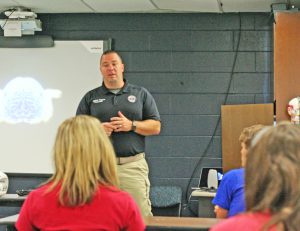
Kendra Peek/kendra.peek@amnews
Boyle County EMS Capt. Mike Rogers talks to teens during the Truth Tour. He was joined by Boyle County K9 deputies Casey McCoy and Keith Addison to share with teens the dangers they see when people begin using drugs.
Before talking with Daniel and Newkirk, the teens and their parents were separated. Parents heard from Wofford at the Boyle County Detention Center, while teens walked next door to the Boyle County EMS to hear from Capt. Mike Rogers and Boyle County Sheriff’s K9 deputies Casey McCoy and Keith Addison. The three shared with teens about myths of drug use and how dangerous it really is.
They cautioned the teens that drugs which most people deem as “safe,” such as vapes or marijuana, are not safe and there is no way to know what’s in the drugs. Sometimes, they said, dealers will mix the drugs with other drugs to get people hooked on something harder.
“If someone tries to give it to you or sell it to you, they’re not your friend,” Addison said. Drugs that people think are not a big deal are a big deal, he said, and can still lead to harder use.
Rogers shared with teens what effects opioids, such as heroin, could have on their bodies. “It suppresses your respiratory drive. If you take too much of it, you just stop breathing. That’s very dangerous, right? But everyday, we see it, almost everyday,” he said. Narcan, Rogers said, blocks that effect which is why it is used to revive individuals having an overdose.
“It’s pretty scary,” he said. “Why do you think people do that? If I told you right now, ‘Here, take this. It feels pretty good, but it might kill you,’ would you do that? Does that even sound appealing at all?”
Few answers were given by the teens.
Addison and McCoy said many people try heroin because they were already on some type of pain medication due to a sports injury, a car wreck, or something else.
“Once they’re addicted to the pills, they can’t get the pills any more, so they try heroin,” Addison said. He broke down the thousands of dollars in court, bond and attorney fees that someone could face if they were caught with the drugs or trafficking the drugs.
McCoy said, “Not to mention, you’re a felon.” That, they said, made it more difficult to find work, took away the freedoms to vote and carry a gun — so no hunting, McCoy said — and more.
“It doesn’t sound like fun, does it,” Rogers said, explaining that drugs will physically change someone’s brain so that all they can think about is the next drug, no matter what it takes to get it.
“We’re talking stealing from your momma, stealing from your daddy, stealing from your grandparents … people just, they’ll steal anything from anybody, just to get what they need,” McCoy said.
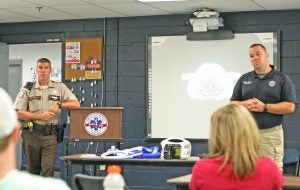
Kendra Peek/kendra.peek@amnews
Boyle County K9 Deputy Keith Addison, left, and Boyle County EMS Capt. Mike Rogers answer questions from teens during the Truth Tour. They were joined by Boyle County K9 Deputy Casey McCoy, not pictured, to share with teens the dangers they see when people begin using drugs.
Addison said sometimes they do worse things. “They sell themselves sometimes. We’ve seen that — especially with the females,” he said. “We’ve had really good kids in the community, really good kids, get hooked on some kind of drug and they turn out to do crazy stuff — stuff we would never imagine they would do. Once your body thinks you have to have it, you can’t quit.”
Most users, he said, later become traffickers to support their habit. Daniel told the teens and parents he was one of those.
“To keep hiding it from my family, I was going to start selling it, so I could support my habit and still have the money I needed,” he said. “I started selling drugs. That’s when stuff really gets bad. That’s why I’m here now.”
He said he was in on charges of trafficking heroin and meth, calling them “big boy charges,” that carry sentence lengths of about 10 years.
“This ain’t no joke,” Daniel said. “Now, you might not get that one time to try and say, ‘No, that’s not for me.’ You might get that one time and your parents are burying you. You can take one puff of this stuff and that’s it … don’t risk it guys. It might be one that gets you addicted or it might be one that puts you in the ground.”
Newkirk said it started as fun for him.
“It can start as a weekend thing, but it becomes an every day thing. It gets worse and worse.” And selling, he said, can be dangerous too — having sold, he was shot at, stabbed and more.
“It true when they said it’s death or jail … there ain’t no other. There ain’t no in between or no third option. That’s the only options you end up with.”
Living with guilt
When asked if their friends influenced their choices, Newkirk said yes, “100 percent.”
“I can’t say I know of a sober friend on the street,” he said — no one puts it down and just walks away easily. Both men said they had lost friends to drugs. For Newkirk, that includes two cousins as well. Both said drugs had also taken the lives of people they once sold to.
Daniel said he worries about his own impact.
“What I struggle with, more, is who did I influence … People I have introduced or sold drugs to are no longer living. That’s something I have to live with for the rest of my life,” he said. “You don’t want that on your conscious, I promise you, you don’t.”
Daniel said he also deals with not seeing his two children.
“I talk to them every day,” he said, explaining that his daughter has asked if she called the jail and asked if her dad would he be allowed to come home. “There’s no way to explain that feeling.”
Newkirk, who doesn’t have kids of his own, said he helped raise others.
“They got into doing the same thing while I was locked up … They learned from what I did, they learned from me,” he said. “Selling drugs, getting high, partying — it ain’t going to get you no where but here … You can try to do it in a different way, but it’s still going to bring you here at the end of the day.”
The best advice, they said, was to stay away from drugs, period.
“Don’t think you can use drugs recreationally. There’s no such thing as a recreational drug user. There’s not,” Daniel said. “You will be come an addict and it will make you do things that will haunt you. I have so much guilt.”
John Masters and his son J.T. Masters were two of the group listening to the stories of Daniel and Newkirk.
“I learned a lot from it,” J.T. Masters said. “The two guys put it in perspective for me how easy it is … Just stay away.”
His dad said it was “the best hour and a half you can spend with your kid.” “The information was to the point. It was very informative, very beneficial,” he said.
When they get out, Daniel and Newkirk want to return to their respective communities. Daniel said he wants to help others stay clean and sober.
“I feel like the only way I can stay sober is by helping other people stay sober.” He said he was amazed at the power drugs had over his life.
“When I look back now, it’s almost unbelievable how powerful a drug gets. Once you’ve been clean for a while, like me, you see it. But when you’re in the grips of addiction, to the point where you will put a needle in your arm to not be sick. I don’t know where the bottom is from there. Death … I don’t have another one in me. If I go back to doing what I was doing, I will die.”
Newkirk, a tattoo artist, said he wants to focus on that career.
“I’m trying to do something different,” he said. “I’m just trying to make a difference.”
SO YOU KNOW
Anyone interested in taking their teen through one of the monthly Truth Tours can contact Chief Deputy Brian Wofford at the Boyle County Detention Center, (859) 238-1127, extension 246.
A Facebook page is in the works in the next few weeks, Wofford said, and will have information regarding upcoming classes as well as photos of each class.


